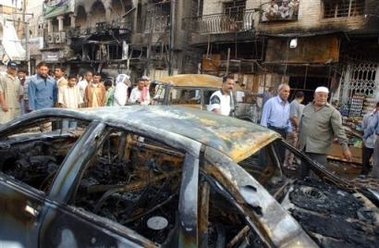|
U.S. issues report on Iraqi roadside bombs
(AP)
Updated: 2005-11-01 19:21
A day after releasing new casualty figures showing that
October was the fourth deadliest month for U.S. forces in the Iraq war, the
military issued a report Tuesday showing how hard it can be to prevent the
deadliest form of attack: roadside bombs.

People look at burned cars, after a powerful
roadside bomb exploded on Monday among civilians in Basra, Iraq, Tuesday,
Nov.1, 2005. On Tuesday, police raised the casualty figures to 20 dead and
71 wounded by the explosion, which occurred along a bustling street packed
with shops and restaurants as people were enjoying an evening out after
the daily Ramadan fast. [AP] |
The report, summarizing combat operations in and around Baghdad over a
five-day period, said U.S. forces had found several powerful roadside bombs
hidden in two vehicles on Saturday.
The day before, soldiers caught three suspected insurgents planting a bomb
along a street and defused it before it could be used in an attack. On Thursday,
a roadside bomb exploded, damaging a U.S. patrol, and when its soldiers chased
three Iraqi men into a nearby home, they found it contained more bomb-making
materials, the military said.
On Monday, the U.S. command reported that seven American service members were
killed, six on Monday and one on Sunday. All of them were victims of
increasingly sophisticated roadside bombs that have become the deadliest weapon
in the insurgents' arsenal.
The new deaths made October the fourth deadliest month for troops here since
the war began. A powerful roadside bomb also exploded on Monday among civilians
in Basra, Iraq's second-largest city and the major metropolis of the
Shiite-dominated south, which has witnessed less violence than Sunni areas.
On Tuesday, Basra police raised the casualty figures to 20 dead and 71
wounded. The attack occurred along a bustling street packed with shops and
restaurants as people were enjoying an evening out after the daily Ramadan fast.
In new attacks on Tuesday, two roadside bombs exploded, one in Baghdad and
one south of the capital, killing a police officer and wounding three Iraqis,
officials said.
On a road near Kirkuk, 180 miles north of Baghdad, a suicide attacker with
explosives hidden beneath his clothes lunged at a police patrol that had been
slowed by traffic, wounding the city's police commander, Col. Khatab Rash, and
his driver, police said.
Military commanders have warned that Sunni insurgents will step up their
attacks in the run-up to the Dec. 15 election, when Iraqis will choose their
first full-term parliament since the collapse of Saddam Hussein's regime in
2003.
To guard against such attacks, the military has raised the number of American
troops in Iraq to 157,000 — among the highest levels of the Iraq conflict.
Most of the combat deaths and injuries in recent months have been a result of
the increasing use by insurgents of sophisticated homemade bombs. The military
refers to those bombs as "improvised explosive devices," or IEDs.
Last Friday, an IED killed Col. William W. Wood, 44, of Panama City, Fla. an
infantry battalion commander. He was promoted posthumously, making him the
highest-ranking soldier killed in action in the Iraq conflict, according to the
Pentagon.
"We see an adversary that continues to develop some sophistication on very
deadly and increasingly precise stand-off type weapons — IEDs, in particular,"
Pentagon spokesman Lawrence Di Rita told reporters Monday.
The insurgents continually search for new and more effective ways to use
IEDs, Di Rita said, while U.S. forces look for new ways to counter the threat.
"We're getting more intelligence that's allowing us to stop more of these
things, find more of them. So we're learning from them and the enemy is learning
from us, and it's going to be that way for as long as there is an insurgency,"
he said.
Monday's deadliest attack against U.S. service members came in an area known
as the "triangle of death." Four soldiers from the U.S. Army's Task Force
Baghdad died when their patrol struck a roadside bomb in Youssifiyah, 12 miles
south of Baghdad.
Two other soldiers from the Army's 29th Brigade Combat Team were also killed
in a bombing Monday near Balad, 50 miles north of the capital. The U.S. military
also reported that a Marine died the day before in a roadside bombing near
Amiriyah, an insurgent hotspot 25 miles west of Baghdad.
The U.S. military death toll for October is now at least 92, the highest
monthly total since January, when 106 American service members died — more than
30 of them in a helicopter crash that was ruled an accident. Only during two
other months since the war began has the U.S. military seen a higher toll: in
November 2004, when 137 Americans died, and in April 2004, when 135 died. The
latest deaths brought to 2,025 the number of U.S. service members who have died
since the Iraq war began in March 2003. The number includes five military
civilians.
The ongoing violence has killed a far greater number of
Iraqis.
|